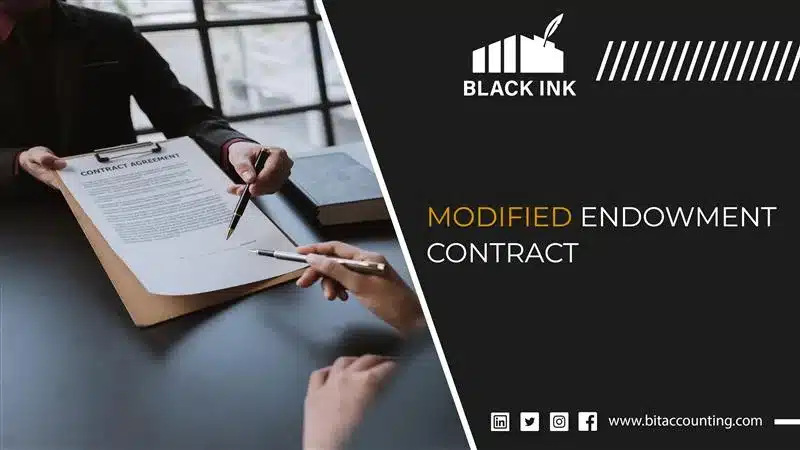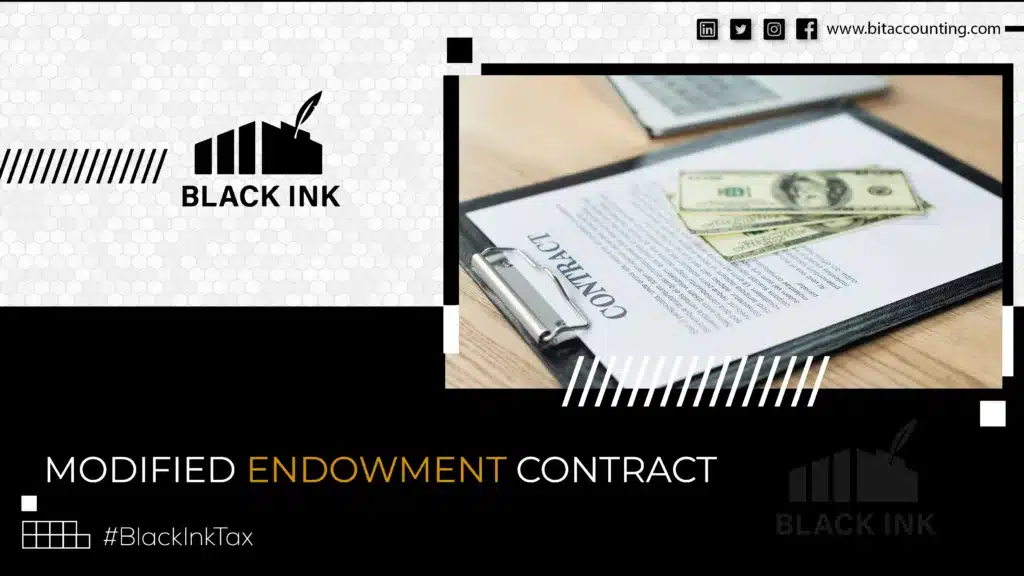
Table of Contents
Modified Endowment Contract (MEC): All You Need to Know
When it comes to life insurance and money planning, one important term many people don’t understand is the Modified Endowment Contract (MEC). These special types of insurance policies can offer benefits, but they also come with unique tax rules that can surprise policyholders if they’re not careful.
In this guide, we’ll explore what MECs are, how they differ from traditional life insurance, and why knowing the rules matters. Whether you’re planning your retirement, managing your personal finances, or simply want to understand how your insurance policy works, this post will walk you through everything you need to know.
What is a Modified Endowment Contract (MEC)?
A Modified Endowment Contract (MEC) is a life insurance policy that has been funded with too much money too quickly. This can change how the policy is treated under Internal Revenue Service (IRS) tax rules, especially under IRC Section 7702A. Once a policy becomes an MEC, it loses some tax-friendly features that other life insurance plans enjoy.
How a Life Insurance Policy Becomes an MEC
Life insurance policies are meant to provide a death benefit and grow cash value slowly over time. However, if you pay too much into a policy early on, it can turn into an MEC. This usually happens when the total premium payments exceed what’s allowed by the IRS during the first seven years of the policy.
The 7-Pay Test
This rule is called the 7-pay test, and it’s the key tool the IRS uses to check if a policy should be classified as an MEC. If you pay more than the allowed amount during the first seven years, the policy becomes a Modified Endowment Contract and stays that way for life.
Key Characteristics of an MEC
- Tax-deferred cash value growth like other life policies
- But loans and withdrawals are taxed differently (we’ll explain more below)
- Less flexibility for using policy funds without paying income tax
- May come with penalties if you take out money before age 59½
How Does a Life Insurance Policy Become an MEC?
The 7-Pay Test Explained
The 7-pay test looks at whether the policyholder has paid more into their insurance policy than needed to keep it active for the first seven years. If they have, it turns into a Modified Endowment Contract. For example, if your yearly premium limit is $5,000, but you pay $10,000, the policy fails the test.
This rule helps prevent people from using life insurance only as a tax shelter or a type of high-interest investment.
Other Factors That Can Trigger MEC Status
- Policy changes like increasing the death benefit
- Late premium payments that are made up all at once
- Loans or withdrawals that affect the balance or structure
These adjustments can cause the policy to fail the 7-pay test retroactively. That’s why it’s important to work with a financial adviser when making changes.
Tax Implications of an MEC
One of the biggest downsides of an MEC is how the tax rules change.
Taxation of Withdrawals and Loans
With a regular life insurance policy, you can often take out loans from your cash value without paying taxes. But with an MEC, the IRS uses the LIFO (Last In, First Out) method. This means your gains come out first, and those are taxed as ordinary income.
Also, if you take out money before age 59½, you may face a 10% penalty, just like early withdrawals from a 401(k) or IRA.
Death Benefit and Estate Tax Considerations
Good news: even if a policy is an MEC, the death benefit is usually still tax-free for your family. However, in some estate planning cases, the value of the policy can be taxed if it’s part of your estate. This ties into estate law and public policy, which vary by state and depend on how the policy is owned.
Comparing MEC to Other Tax-Advantaged Accounts
Account Type | Tax on Contributions | Tax on Growth | Tax on Withdrawals |
MEC | After-tax | Tax-deferred | Taxed & penalized (before 59½) |
401(k) | Pre-tax | Tax-deferred | Taxed as income |
Roth IRA | After-tax | Tax-free | Tax-free (after 59½) |
While an MEC offers no contribution limits and life insurance coverage, it’s less flexible than a Roth IRA and more complex than a 401(k). Yet, for high-income earners, it may offer a path for tax-efficient retirement savings.

Pros and Cons of an MEC
Advantages of an MEC
- Tax-deferred growth of the cash value
- No contribution caps, unlike retirement plans
- Death benefit protection for beneficiaries
- Can help with estate planning or long-term care needs
Disadvantages of an MEC
- Loss of tax-free loan benefits
- Penalties for early withdrawals
- Less flexibility than regular whole life insurance
- Can be complicated due to overlapping finance and taxation laws
Common Misconceptions About MECs
Let’s clear up a few common myths about Modified Endowment Contracts:
- “MECs are illegal or bad.” MECs are fully legal under United States law. They’re just different, and not right for everyone.
- “All overfunded policies are MECs.” Not true. You can add money to a policy without breaking the 7-pay rule, depending on how it’s structured.
- “MECs remove all tax benefits.” Also false. The cash value still grows tax-deferred, and the death benefit is usually still tax-free.
Strategies to Avoid (or Intentionally Use) an MEC
Here are some strategies to avoid an Modified Endowment Contracts (MEC):
How to Prevent a Policy from Becoming an MEC
- Track your premium payments closely
- Avoid making large changes without checking the effects
- Work with a financial adviser who understands insurance, taxation, and private law
This is especially important for those managing corporate finance or running a limited liability company (LLC). Proper planning can help avoid surprises.
When Might an MEC Be Beneficial?
Sometimes, it makes sense to have an MEC:
- High-income earners may use MECs for tax-efficient growth after maxing out other retirement accounts
- Estate planning for large assets or inheritance strategies
- Building retirement income streams with built-in life insurance protection
Conclusion
A Modified Endowment Contract is a type of life insurance that has special tax rules. It can be a helpful tool for some people, especially those with large incomes or unique financial goals. However, it also comes with tax risks if not handled properly. Always understand how the 7-pay test works, monitor changes to your policy, and speak with a trusted financial adviser.
Need help with understanding how MECs fit into your personal or business plan? BIT Accounting offers professional services in finance, business law, and estate planning to help you make smart financial choices. Reach out to our team today!
FAQs
1: Can an MEC be reversed?
No. Once a policy becomes an MEC, it cannot be changed back. The classification is permanent.
2: What happens if I take a loan from an MEC?
The loan is taxed like a withdrawal. The IRS treats it as income, and penalties may apply if you’re under 59½.
3: Are MECs subject to required minimum distributions (RMDs)?
No, unlike 401(k)s and traditional IRAs, MECs are not subject to RMDs.
4:How do I know if my policy is an MEC?
You can ask your insurance provider or consult your financial adviser. They can review your policy and help you understand where it stands.
GET FREE QUOTE FOR ALL OF OUR SERVICES
Black Ink will send you a free analysis of your current state and what would be the cost of managing either a separate accounting and bookkeeping services or a complete solution across New York, USA. Do get in touch and we will be happy to consult you with our bookkeeping services in NY, New York, USA.
